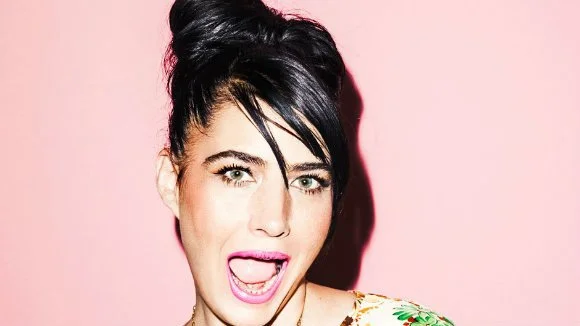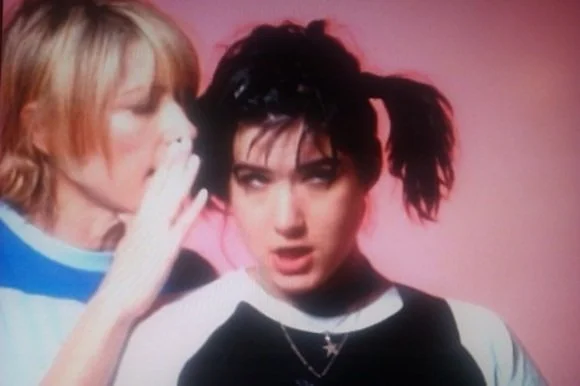Kathleen Hanna: Riot Grrl Royalty
It seems like lately riot grrl is getting a lot of attention again, whether it's through 90s nostalgia generally or specific things like your documentary The Punk Singer; why are people coming back to it and why now?
Well I think feminism goes in 20 year waves and I think part of is because when there's a lot of activity — say in the 60s and 70s or in the late 80s and early 90s — there's a lot of shit that goes with being part of a community. A lot of the stuff that goes down that has been really negative and chilling — then after 20 years, we all come out of the wood work and start writing our books and making records that deal with it — partially because it takes that long to deal with the damage of the past, but also to reach back and remember the hopefulness and the joy that comes with doing political work that's associated with the arts.
Then I think there's the other part of it where, you know, there's a nostalgia for Nirvana and the 90s and riot grrl is a part of that. I'm always like, "bring on the nostalgia. I don't give a shit." If that's what gets people to the shows, fine. 'Cause they're going to love it. 'Cause we're great. [laughs] Like, if people read a book about riot grrl because they're interested in the fashion, they might start reading it and go "Wait a minute, I'm a feminist" or "I wanna start something."
Is it getting easier or harder for a bunch of girls to start a band, compared to how it was back then?
Well, I wouldn't want to say something like "You guys have it so much better!" 'cause I'm not a 20-year-old starting a band today. But the one thing I do see is that the audiences have changed so much. When I started playing music when I was 19, and even going to shows when I was in high school, underground music was all guys. Me and my two girlfriends would literally be the only girls at punk shows. So that definitely has changed — and in terms of just underground music, there's such a more diverse presence in the audience than there was before, and that means there's more diversity on stage too. So I see that as a huge leap ahead, but I also see girl bands that get so viciously attacked on the internet, in a way that their male peers don't. Stuff like "They're too pretty. That's the only reason they're getting attention," or "that one's ugly." You know what I mean? Just being judged on their looks not on the merit of their work. Everybody wants to talk about personality when it comes to female musicians, but no one wants to talk about the music.
Do you pay much attention to pop music?
I thought the Macklemore and Ryan Lewis 'Same Love' song was an exciting addition to the pop lexicon. It brought up really interesting ideas and criticisms too, about authenticity and ownership. I'm not a big Macklemore fan or anything. I've never heard anything else that that person has brought out, but I just happened to hear it, and I was like "Woah, this is mainstream? Maybe I should pay more attention." [laughs] Of course, I was interested in the whole Robin Thicke 'Blurred Lines' controversy. Then I saw the video and just thought "This is exactly the same as like, 'Cherry Pie.'" I don't see it as being any more — there's sexism everywhere you look. That video wasn't worse than any other thing. I mean, Justin Timberlake wrote a song called 'Take Back the Night', not even knowing that it's a movement that's been going on for 30 or 40 years. Like, you don't even have your people type the title of your song into Google? [laughs]
Speaking of Robin Thicke...
Oh, Miley Cyrus? I didn't see the performance, so I don't really have any commentary on that. I think calling a young girl a 'slut' or something like because of what she wears is, of course, completely insane. It's just more of the same, you know? And twerking! It's a stripper move. I don't understand what the big deal is about it.
It's something strippers have done since the beginning of time. So I don't know why all of a sudden it became called 'twerking.' It's just what you do for a 20, as a working girl. It's happening in strip bars all over the world. But nobody seems to give a shit. [laughs]
If you could talk to yourself as a teenager, what advice would you give yourself?
I guess I would tell myself that I'm perfect how I am. Stop always worrying about what you look like and what clothes you wear, 'cause in the end it's not important. What's important is friendship and being creative. Being part of the solution — something that's bigger than yourself. I definitely would also be like "Here, read the Scum Manifesto by Valerie Solanis right now!" 'Cause it's hilarious. Or "Read The Dialetics of Sex by Firestone," or "go take some classes." We didn't have anything about women's history at school, so we had to educate ourselves about that stuff. Hopefully that's what young girls are doing now, when they read about riot grrl or whatever. There's a book called Girls to the Front about riot grrl that's pretty spot on, if anyone wants to look into it.
Originally published on oystermag.com
How do you even introduce Kathleen Hanna? She's best known as the front woman from Bikini Kill, who introduced riot grrl punk to mainstream America and the world in the 90s. She made a solo record under the name Julie Ruin, then started Le Tigre. After a serious illness, she's back. This time, as the singer in The Julie Ruin — a collaborative extension on her earlier EP project. This is the gal who has encouraged thousands of girls to pick up guitars, or a microphone or a pen and express some girl-rage. The Julie Ruin have just announced that they're touring Australia in early January, so we gave her a call.
Jerico Mandybur: How did Julie Ruin go from a solo project in 1998 to The Julie Ruin band that it is today?
Kathlen Hanna: In 1998 my band, Bikini Kill, was kind of disintegrating. It had really been my whole identity. You hear about people who get a divorce and they say "I don't know who I am anymore," well I really feel like I got divorced from three people at the same time. [Hears a child crying in the background] Is that your kid?
No, I'm just sitting in a playground.
Oh, that's funny. So I was really scrambling and I didn't know who I was. I'd been an outspoken feminist in the underground punk scene for a while, and everybody was like "She's such a bitch" or "She's a feminazi; she hates men," that kind of stuff. I got sick of people treating me like I was an asshole, or I was difficult, or doing something wrong. There was just so much stuff going on for somebody for who was 26 years old. So I made the record to figure out who I was again. Then similarly now, I just went through a kind of harrowing illness. I had Lyme disease — I had to have an IV run into my heart for nine months and IV bags every day. For a very long time, I didn't know what was happening. I was extremely ill and I didn't know if I was just going to get worse and worse.
So I realised that I needed Julie Ruin again, who was this character I created who was stronger than I was and just didn't give a shit about anything. Except being creative and making things. The original Julie Ruin was about maintaining hope when I felt really miserable and the new Julie Ruin was about maintaining hope when, you know, I thought I was dying. Once a week or every few weeks when I would feel well enough, I'd meet with my friends and we would work together and write. So it gave me something to look forward to. So that's why we decided to name the project The Julie Ruin, because now it's a collaborative project.
Are you looking forward to coming back to Australia; how do you find the crowds here?
Well the last Le Tigre tour I did there was with a festival. Especially when you play during the day, festivals are always a bit weird and discombobulated. People will be sitting on blankets or, you know, figuring out where to get their food from. So the total fans are in the front two rows. They're really into it and that's who you play to. I've found that club gigs in Australia are incredibly fun. I always remember them as being really sweaty and chaotic and awesome. The people there are really really cool. I've played some of my best shows in Australia. I played a great show in Tasmania. I'm so excited to go back to Hobart!

